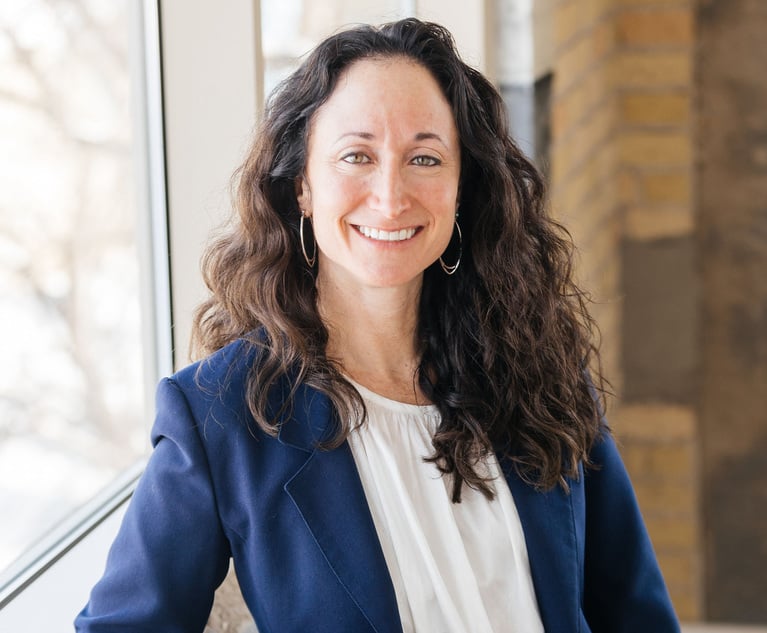New Solutions Are Needed to Fix a Gender Pay Gap That's Getting Bigger
The gender pay gap defies all expectation in its persistence—but we needn't accept it, and we can begin to fix it. But doing so will require new thinking and a focus on the fundamentals. And in law, as elsewhere in business, one of those fundamentals is money.
December 13, 2018 at 02:35 PM
7 minute read
 It's disheartening to learn from recent reporting on Major, Lindsey & Africa's 2018 Partner Compensation Survey that the gender pay gap in law is not only stubbornly persistent—it's actually getting worse.
It's disheartening to learn from recent reporting on Major, Lindsey & Africa's 2018 Partner Compensation Survey that the gender pay gap in law is not only stubbornly persistent—it's actually getting worse.
Yes, you read that correctly. Even in 2018, following decades of effort to increase gender equity in law, and even in the high stakes business culture of the #MeToo era, male Big Law partners today earn on average 53 percent more than women. In 2010, the gap stood at 32 percent.
That growing gap is frustrating in the extreme. Over the course of my 23-year career as a woman lawyer, first at Cravath, Swaine & Moore, and then in-house at Time Warner, the largest media company in the world at the time, the gender gap has been impossible to ignore. Despite the various efforts of law firms, clients and policy makers—not to mention women and men eager for a more equitable world—we have not achieved the change we seek.
But rather than merely greeting this latest research with bitter complaint—as tempting as that may be—I'd like to tease out the factors that underpin the gender pay gap in law and suggest a new solution that, alongside all the other important initiatives, can begin to close it.
In my view, when we think about closing the gender pay gap in law, we need to focus on changing the economics. By changing the economics, we can change outcomes—because for better or worse, Big Law is big business and money talks.
According to the research report, one of the major factors underpinning the widening pay gap in Big Law is this: Origination.
As reported by The American Lawyer: “The study pins much of the gap on originations. Male partners reported average originations of $2.788 million—a gain of 8 percent over 2016. That compares to $1.589 million for female partners—a decline of 8 percent from 2016.”
Put simply: Women get less origination credit than men, and at most law firms, bringing in clients is, and almost certainly will remain, the make or break basis for everything else—including not only for compensation but also for opportunities for advancement and leadership that pave the way to accessing longer term payoffs like equity partnerships.
In other words, addressing the origination problem is one way to help close the gender pay gap in law.
Let's be clear: The issue is definitively not that women are not as good at origination as men. It's that women receive less origination credit than men. As Roberta D. Liebenberg recently explained in an October roundtable, “Contributing to the persistent gender pay gap at the partner level is the fact that women partners receive only 80 percent of the origination credit given to men. One of the reasons for this disparity is the fact that women are less likely to be chosen to serve as lead partners on matters.” As Katherine B. Forrest, former U.S. District Judge for the Southern District of New York, remarked in that same roundtable: “Structurally, law firms and other professional service organizations have persisted for many years in rewarding those who operate in the most visible positions—with credit for client work at many companies attributed to the origination or relationship partner.”
My own experience in the nearly 10 years that I've led the investment team at Burford Capital reinforces how few women are in lead positions on high value matters. Of the many thousands of matters we've reviewed for financing over our almost 10-year history, under 10 percent have been led by women lawyers. We do see the numbers getting better, but at a frustratingly slow pace.
As I said above, if we want to change outcomes, we need to change economics. So, if we want to ensure that women get more opportunities to lead matters—and get origination credit for those matters and relationships—we need to create economic incentives for that change. Economic incentives can generate decisive and immediate change and promote different outcomes—now.
It's this thinking that led to The Equity Project, which Burford launched in October 2018 with a $50 million pool of capital earmarked for financing commercial litigation and arbitration matters led by women.
The Equity Project's $50 million will be reserved for financing matters in which a woman litigator is first chair; a woman serves as plaintiffs' lead counsel or chairs the plaintiffs' steering committee; a women-owned law firm is representing the client; a woman litigator earns origination credit; or a woman partner is the client relationship manager.
Critical to The Equity Project are a group of nearly two dozen “Champions”—women and men drawn from leading law firms and corporations around the world who are committed to changing outcomes for women in law. We're honored to count Ms. Liebenberg and Judge Forrest among them. The latter captured the aims of the initiative when she said: “The Equity Project creates economic incentive for law firms and clients to position women lawyers as lead counsel in complex commercial litigation matters, a critical step in opening the door for more women to rise in the ranks of their respective firms and win the confidence of clients across industries. Designed to be outcome-driven, the project also incentivizes the early training and professional development of women lawyers to ensure they build a strong and effective skill set to meet the evolving needs of their clients.”
With capital from The Equity Project, women litigators and women-owned firms can pitch clients knowing that they can offer attractive alternative fee arrangements. A woman lawyer can show a client it's possible to fund their litigation without adding pressure to their balance sheet. She can use litigation financing to convince her firm's contingency fee committee to move forward with a case she might otherwise not bring to the committee. Litigation financing can help a litigator demonstrate (to a client, a firm management committee or even a company CEO) that she's an innovative thinker, and that she's aggressive and ambitious about landing new clients and serving them well. An in-house lawyer can use litigation finance to transform her in-house team from a cost center to a profit center, showcasing her financial shrewdness and leadership ability. Law firms committed to gender diversity can share risk with Burford and encourage women litigators to pitch client-friendly alternative billing arrangements to their management committees for new business. Women can pursue leadership positions in significant matters and ease pathways towards origination and client relationship credit with a competitive edge for them and their firms.
As we learned from the most recent research, the gender pay gap defies all expectation in its persistence—but we needn't accept it, and we can begin to fix it. But doing so will require new thinking and a focus on the fundamentals. And in law, as elsewhere in business, one of those fundamentals is money.
Aviva Will is Senior Managing Director of Burford Capital, a leading global finance firm focused on law and the world's largest provider of litigation finance.
This content has been archived. It is available through our partners, LexisNexis® and Bloomberg Law.
To view this content, please continue to their sites.
Not a Lexis Subscriber?
Subscribe Now
Not a Bloomberg Law Subscriber?
Subscribe Now
NOT FOR REPRINT
© 2025 ALM Global, LLC, All Rights Reserved. Request academic re-use from www.copyright.com. All other uses, submit a request to [email protected]. For more information visit Asset & Logo Licensing.
You Might Like
View All
Neighboring States Have Either Passed or Proposed Climate Superfund Laws—Is Pennsylvania Next?
7 minute read

Relaxing Penalties on Discovery Noncompliance Allows Criminal Cases to Get Decided on Merit
5 minute read
Trending Stories
Who Got The Work
J. Brugh Lower of Gibbons has entered an appearance for industrial equipment supplier Devco Corporation in a pending trademark infringement lawsuit. The suit, accusing the defendant of selling knock-off Graco products, was filed Dec. 18 in New Jersey District Court by Rivkin Radler on behalf of Graco Inc. and Graco Minnesota. The case, assigned to U.S. District Judge Zahid N. Quraishi, is 3:24-cv-11294, Graco Inc. et al v. Devco Corporation.
Who Got The Work
Rebecca Maller-Stein and Kent A. Yalowitz of Arnold & Porter Kaye Scholer have entered their appearances for Hanaco Venture Capital and its executives, Lior Prosor and David Frankel, in a pending securities lawsuit. The action, filed on Dec. 24 in New York Southern District Court by Zell, Aron & Co. on behalf of Goldeneye Advisors, accuses the defendants of negligently and fraudulently managing the plaintiff's $1 million investment. The case, assigned to U.S. District Judge Vernon S. Broderick, is 1:24-cv-09918, Goldeneye Advisors, LLC v. Hanaco Venture Capital, Ltd. et al.
Who Got The Work
Attorneys from A&O Shearman has stepped in as defense counsel for Toronto-Dominion Bank and other defendants in a pending securities class action. The suit, filed Dec. 11 in New York Southern District Court by Bleichmar Fonti & Auld, accuses the defendants of concealing the bank's 'pervasive' deficiencies in regards to its compliance with the Bank Secrecy Act and the quality of its anti-money laundering controls. The case, assigned to U.S. District Judge Arun Subramanian, is 1:24-cv-09445, Gonzalez v. The Toronto-Dominion Bank et al.
Who Got The Work
Crown Castle International, a Pennsylvania company providing shared communications infrastructure, has turned to Luke D. Wolf of Gordon Rees Scully Mansukhani to fend off a pending breach-of-contract lawsuit. The court action, filed Nov. 25 in Michigan Eastern District Court by Hooper Hathaway PC on behalf of The Town Residences LLC, accuses Crown Castle of failing to transfer approximately $30,000 in utility payments from T-Mobile in breach of a roof-top lease and assignment agreement. The case, assigned to U.S. District Judge Susan K. Declercq, is 2:24-cv-13131, The Town Residences LLC v. T-Mobile US, Inc. et al.
Who Got The Work
Wilfred P. Coronato and Daniel M. Schwartz of McCarter & English have stepped in as defense counsel to Electrolux Home Products Inc. in a pending product liability lawsuit. The court action, filed Nov. 26 in New York Eastern District Court by Poulos Lopiccolo PC and Nagel Rice LLP on behalf of David Stern, alleges that the defendant's refrigerators’ drawers and shelving repeatedly break and fall apart within months after purchase. The case, assigned to U.S. District Judge Joan M. Azrack, is 2:24-cv-08204, Stern v. Electrolux Home Products, Inc.
Featured Firms
Law Offices of Gary Martin Hays & Associates, P.C.
(470) 294-1674
Law Offices of Mark E. Salomone
(857) 444-6468
Smith & Hassler
(713) 739-1250






